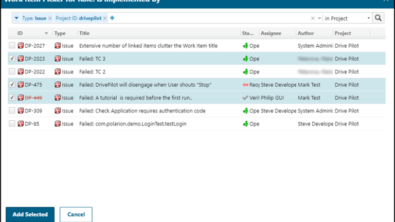3 Questions Medical Device Manufacturers Should Ask in the Hunt for Better Traceability
By Veijo Inkiläinen, Planmeca Group
Planmeca Group is a leading manufacturer of dental and mammography x-ray imaging and dental care products, with sales in more than 100 countries, since 1971. We make safe medical devices with outstanding clinical performance for patients and users.
Our operation is regulated by medical industry standards such as ISO 13485, ISO 14971, IEC 60601, IEC 62304 and by European Union medical device directives as well as U.S. FDA QSR laws. The Regulatory view to the operation of a medical device manufacturer can be simplified by asking 3 important questions.
 1. Did we do the product right?
1. Did we do the product right?
Were all product requirements satisfied and how do we prove it? TRACEABILITY is the answer and the keyword in developing medical devices.
In the past, it was very hard for us to maintain traceability between requirements, safety risks, risk mitigation controls and testing. How many volunteers would you find to manually update a traceability worksheet with hundreds or thousands of rows containing interrelated data? Polarion’s easy-to-use linking has been a tremendous help to us in tracking traceability, and the live reports show us the actual status of all related data.
2. Did we do the right product?
Did customers get what they asked for? A quality management system provides a framework for gathering user needs and requirements from various stakeholders and pushing them to a product lifecycle machine. The eventual output is a validated and finalized product.
To produce products meeting standards and requirements you need a management system. Pen and paper (or even office documents) simply will not be adequate for managing thousands of requirement and testing artifacts. (And yet, hundreds of companies continue to struggle with just such a solution!)
Polarion puts artifacts under control and makes quality management processes a part of the doing instead of just being a “quality handbook” lying long forgotten in a cabinet.
3. Are we still in control what we do?
Internal and external audits are regular and more frequent year by year in companies manufacturing medical products. An audit confirms the status of compliance checking – so that laws, processes and standards are followed in the company. Corrective and preventive actions (CAPA) are needed, when deviations are observed.
Polarion’s tools provided us a cost-effective and efficient way of replacing our obsolete system in audit and CAPA management. In the future we are eager to see Polarion’s impact on development speed in other product development areas as well.
About the Author:
 Veijo Inkiläinen works as Process Development Manager in Planmeca Group based in Finland, and is CEO of Vegeli Ltd. offering product development lifecycle consultancy services to medical device manufacturers together with Taipuva Consulting Ltd.
Veijo Inkiläinen works as Process Development Manager in Planmeca Group based in Finland, and is CEO of Vegeli Ltd. offering product development lifecycle consultancy services to medical device manufacturers together with Taipuva Consulting Ltd.
Creative Commons Photo: Flickr/André Mouraux
Join Us for Polarion Day at Nordics 2014
 You can meet this Polarion customer, plus the team from Polarion’s country partner for Finland Taipuva Consulting Oy at Polarion Day at Nordics 2014, April 15th, 2014 09:00 – 16:00. Presentation and discussion topics include:
You can meet this Polarion customer, plus the team from Polarion’s country partner for Finland Taipuva Consulting Oy at Polarion Day at Nordics 2014, April 15th, 2014 09:00 – 16:00. Presentation and discussion topics include:- ALM and its benefits
- Demos: requirements management, test management, change management, reporting
- What’s new in Polarion 2014
- Polarion vision and roadmap
- Guest speakers
For more info, location, and complete schedule and to register for the event, visit the registration page at Taipuva Consulting.


